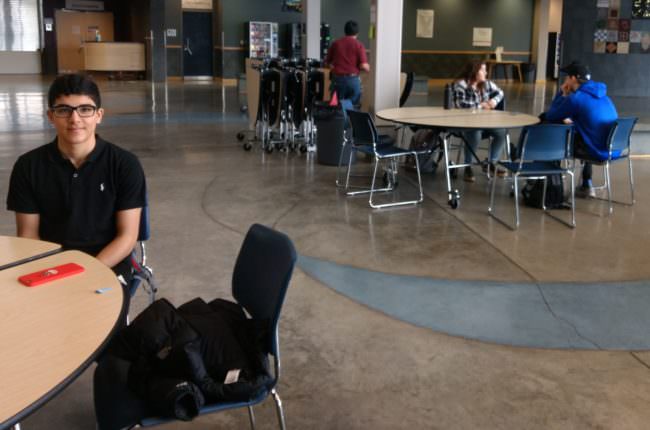
A federally funded exchange program has welcomed high school students from Muslim majority countries to Juneau for the past six years, despite uncertainty over the Trump administration’s ongoing attempt to impose a blanket travel ban targeting Muslims.
Now, the program is looking for host families for its seventh batch of students.
Mahmoud Abu Aisha is a 17-year-old junior at Thunder Mountain High School. He’s Palestinian from Gaza City.
Israel’s conflict with Hamas has made life there very difficult. So when there are opportunities to study abroad — he and his siblings are among the first to apply.
“My dad and my mom always encourage us to find opportunities outside Gaza,” he said, “so we can have a really good education and experience in our life.”
Gaza has an arid climate and one of the world’s highest population densities — not like Juneau.
“I have never seen mountains and rivers and waterfalls and things,” he said. “It’s so nice here.”
He arrived in late August and began settling in. He’s getting straight As.
Then Donald Trump was elected president and just days into his presidency his fiery campaign rhetoric morphed into executive orders that instated a travel ban against seven Muslim majority countries.
“We have entire regions of the world destabilized by terrorism and ISIS,” the president said March. “For this reason, I issued an executive order to temporarily suspend immigration from places where it cannot safely occur.”
The Palestinian territories weren’t on Trump’s list. But the political climate in the U.S. has arguably shifted.
The president’s implication is that entire regions are under suspicion and he’s vowed to overrule the courts which have so far blocked his executive orders.
Abu Aisha says his family was alarmed by this tough talk.
“I told them that it’s going to be fine and nothing will happen and things like this so then they’re not afraid any more,” he said.
Trump is changing U.S. policy toward the Middle East: Public diplomacy has taken a back seat to domestic security.
“I hope he never finds out about the program. I assume at this point he doesn’t know about it, ” said Judith Maier, the local coordinator for the federally funded Kennedy-Lugar Youth Exchange and Study (YES) Program that since 2011 has brought about 20 students from Muslim majority countries to Juneau.
She said the exchange students initially weren’t fully accepted.
“The first year the kids had to really prove themselves,” Maier said, but says a after exchange students began playing on local sports teams and socializing, “after that they call them friends they have a totally different way of looking at their country. So it’s wonderful.”
When 18-year-old Turkish student Ege Tezcan heard he’d been accepted to study in the U.S. he was excited. When he heard it would be in Alaska he was terrified.
“I was so afraid, at the beginning, I thought maybe it was a different Alaska than I know because some places have the same name,” Tezcan said. “So maybe an Alaska somewhere else, in the Lower 48.”
But the teenager from Istanbul’s fears evaporated. He speaks of the “different and beautiful experiences” including seeing “northern lights.”
The presidential election caught Tezcan by surprise. He said he immediately received anxious messages from Turkey.
“People were like ‘Oh my god — just be careful!’ But I’m just like, ‘Oh, it’s Alaska,” he said. “You know, it’s okay!'”
The YES Program was designed to keep the U.S. safer. It was created in the wake of the Sept. 11 attacks to bridge religious and cultural barriers that feed extremism and is funded by the State Department. And it doesn’t just teach foreign students about the U.S.
Suzy Cohen and her husband, Stuart, hosted a 15-year-old Kurdish student from Istanbul last year in Juneau.
“We learned so much from him — just about the complexities of where he’s from and it was a great experience overall,” Suzy Cohen said.
Her husband said the program doesn’t just impact the exchange student’s view of the United States.
“You’re actually affecting a whole circle of people back there — like his mother and his family and his friends because they hear about it,” Stuart Cohen said. “I think actually the effect is different than — it’s not just one person it’s a number of people.”
Now the couple plans to visit Turkey, and meet the rest of his family.
Another batch of YES exchange students are slated to arrive in Juneau. They’ll be here from mid-August until June and host families are needed. Some financial support is provided. Anyone interested in learning more about getting involved can contact Judith Maier at (907) 789-9229.
